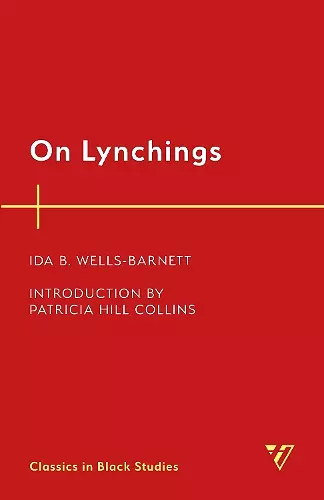On Lynchings
Ida B Wells-Barnett author Patricia Hill Collins editor
Format:Paperback
Publisher:Rowman & Littlefield
Published:30th Sep '22
Should be back in stock very soon

Though the end of the Civil War brought legal emancipation to African-American people, it is a fact of history that their social oppression continued long after. The most virulent form of this ongoing persecution was the practice of lynching carried out by mob rule, often as local law enforcement officials looked the other way.
During the 1880s and 1890s, more than 100 African Americans per year were lynched, and in 1892 alone the toll of murdered men and women reached a peak of 161. In that awful year, the twenty-three-year-old Ida B. Wells, the editor of a small newspaper for blacks in Memphis, Tennessee, raised one lone voice of protest. In her paper she charged that white businessmen had instigated three local lynchings against their black competitors. In retaliation for her outspoken courage a goon-squad of angry whites destroyed her editorial office and print shop, and she was forced to flee the South and move to New York City. So began a crusade against lynching which became the focus of her long, active, and very courageous life.
In New York she began lecturing against the abhorrent vigilante practice and published her first pamphlet on the subject called "Southern Horrors". After moving to Chicago and marrying lawyer Ferdinand Barnett, she continued her campaign, publishing A Red Record in 1895 and Mob Rule in New Orleans, about the race riots in that city, in 1900. All three of these documents are here collected in this work, a shocking testament to cruelty and the dark American legacy of racial prejudice. Anticipating possible accusations of distortion, Wells-Barnett was careful to present factually accurate evidence and she deliberately relied on southern white sources as well as statistics gathered by the Chicago Tribune. Using the words of white journalists, she created a damning indictment of unpunished crimes that was difficult to dispute since southern white men who had witnessed the appalling incidents had written the descriptions. Along with her husband she played an active role in the founding of the National Association for the Advancement of Colored People (NAACP). Due to her efforts, the NAACP launched an intensive campaign against lynching after World War I. Her work remains important to this day not only as a cry...
Ida B. Wells-Barnett’s On Lynchings is not only prescient in our current moment when we’ve seen a resurgence of mob violence and state-sanctioned police brutality against Black people and others seeking freedom and justice; Wells-Barnett’s words provide the intellectual and activist concepts that we need to fight in our present. She pointedly illustrates how the brutalization and murder of Black people is of interest to all for both issues of humanitarianism and capitalism; ultimately, Wells-Barnett in her own right—and as situated beautifully by Patricia Hill Collins—is the foundation from which we can make sense of violence across the U.S. (and globe) and the paths we must take to end it. As we dismantle, reimagine, and create a world that sees the humanity in all of us by centering the most discriminated against among us, Wells-Barnett’s works should be the touchstone we come back to again and again for revelation, motivation, and world-making.
-- Aria S. Halliday, Aria S. Halliday, Assistant Professor of Gender and Women’s Studies and African American and Africana Studies, University of Kentucky, editor of The Black Girlhood Studies CollecISBN: 9781538147382
Dimensions: 218mm x 140mm x 16mm
Weight: 272g
204 pages